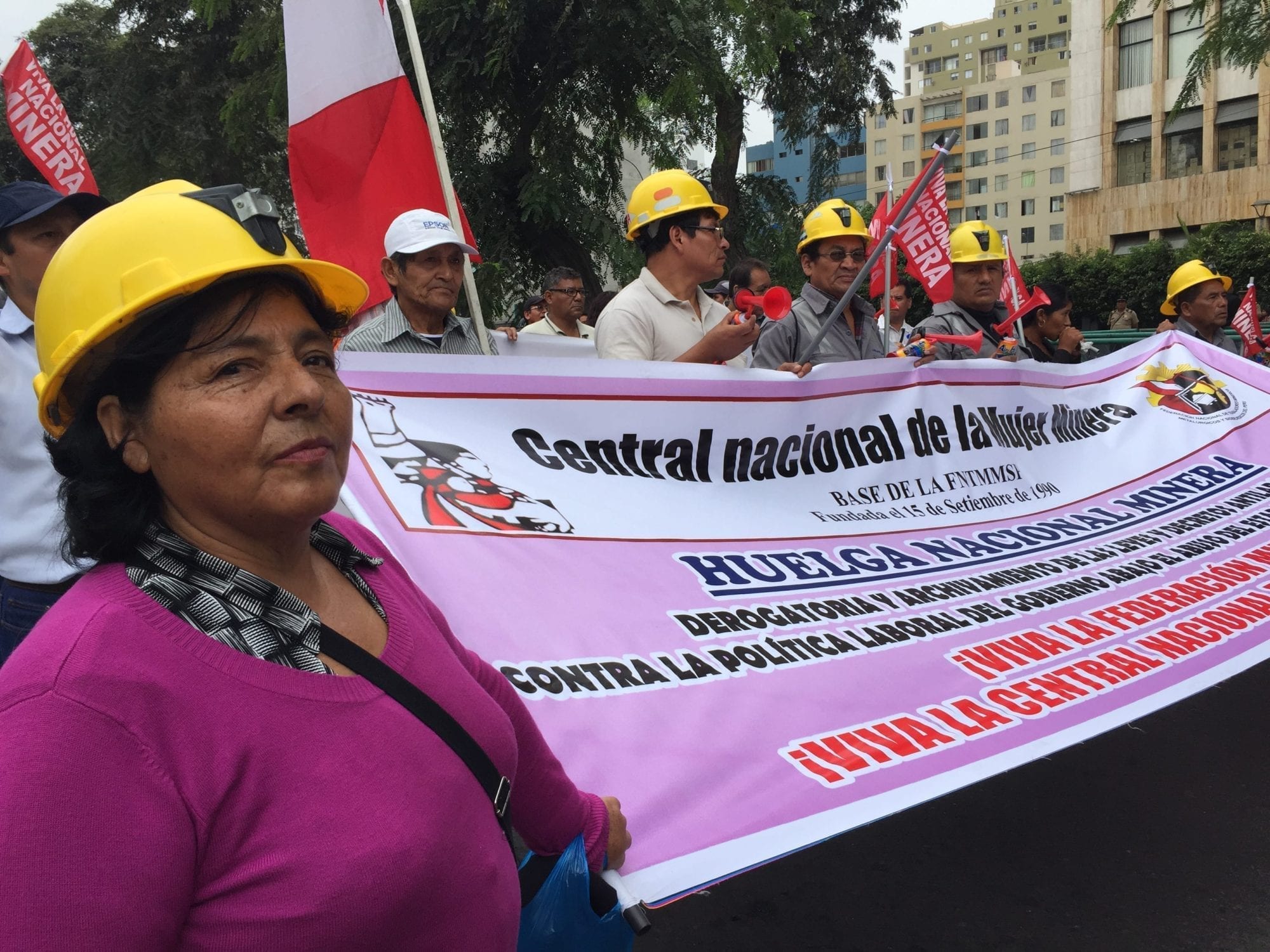
May 20, 2015
Protesting laws that facilitate mass layoffs and enable large-scale subcontracting of workers’ jobs, tens of thousands of Peruvian mineworkers launched a strike Tuesday at the nation’s gold, copper, tin and silver mines in regions such as Cerro de Pasco, Puno, Ancash, and Huánuco. Marching in the main square of Juliaca yesterday, mineworkers shouted, “Down with the outsourcing law, mineworkers unite!”
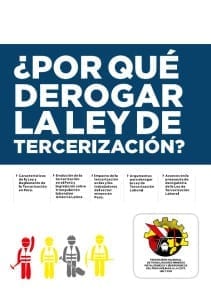
The Mineworkers Federation describes the outsourcing law and why it needs to be repealed in this brochure.
Members of the Mineworkers Federation (FNTMMSP), a Solidarity Center ally, are seeking to halt worker layoffs and prevent passage of a proposed law that, among other detrimental outcomes, would allow 10 percent of workers to be fired when a company reports losses. They are demanding the government repeal outsourcing legislation that union leaders say enables employers to divide the workforce and violate worker rights. (The Mineworkers Federation describes the outsourcing law and why it needs to be repealed in this brochure.)
The Federation is calling for all outsourced workers who currently perform core functions of mining operations to be moved into permanent contracts and also seeks modifications in legislation that would allow outsourced workers to benefit from annual profit sharing, which is the legal right of directly-employed mineworkers.
Further, the Federation is calling for a repeal of additions to Peru’s Health and Safety Law, enacted last July at the request of employers, which make it more difficult for injured workers or their families to hold employers accountable for workplace injuries, among other harmful measures.
Ivan Granados, a mineworker, said employers already are using the mass layoff legislation. Granados told Telesur that “at work, they are starting to fire the workers, saying that the company is losing money. They are … harassing people with threats of firing them. That is why we are here fighting.”
Mining accounts for up to 15 percent of the Peru’s gross national product, and mining exports have grown 4.7 percent over the past year.
“The mineral wealth of a country should be used for the benefit of the people, including the workers, and not to destroy the environment for the benefit of the corporations and politicians,” say United Steelworkers (USW) President Leo Gerard and Sindicato Nacional de Mineros President Napoleón Gómez Urrutia in a joint statement backing the mineworkers.
The USW and Sindicato Nacional de Mineros, whose solidarity statements were read at a press conference yesterday, are part of a broad coalition of supporters Peruvian mineworkers are engaging, one that includes the Confederación General de Trabajadores del Perú (CGTP), unions from the telecommunications, textile/apparel and oil/petroleum industries, as well as independent unions—Red Solidaria—and student and youth organizations. A coalition of students, young workers and unions earlier this year successfully repealed a law that reduced salaries and benefits for workers under age 25.
The Mineworkers Federation and its affiliated unions built the campaign to address outsourcing in the mining sector following Solidarity Center trainings and workshops, begun last year, in which they gained information about documenting worker rights violations and developing a policy proposal to improve outsourcing legislation.
Over the past six months, the Solidarity Center also has supported regional workshops for Federation affiliates to raise awareness and collect more information about how outsourcing is undermining decent working conditions—including health and safety in the mines—freedom of association and the right to collectively bargain in Peru’s mines.
The Mineworkers Federation also has filed a lawsuit alleging that the outsourcing law is unconstitutional, which has been accepted by Peru’s Constitutional Court for review.
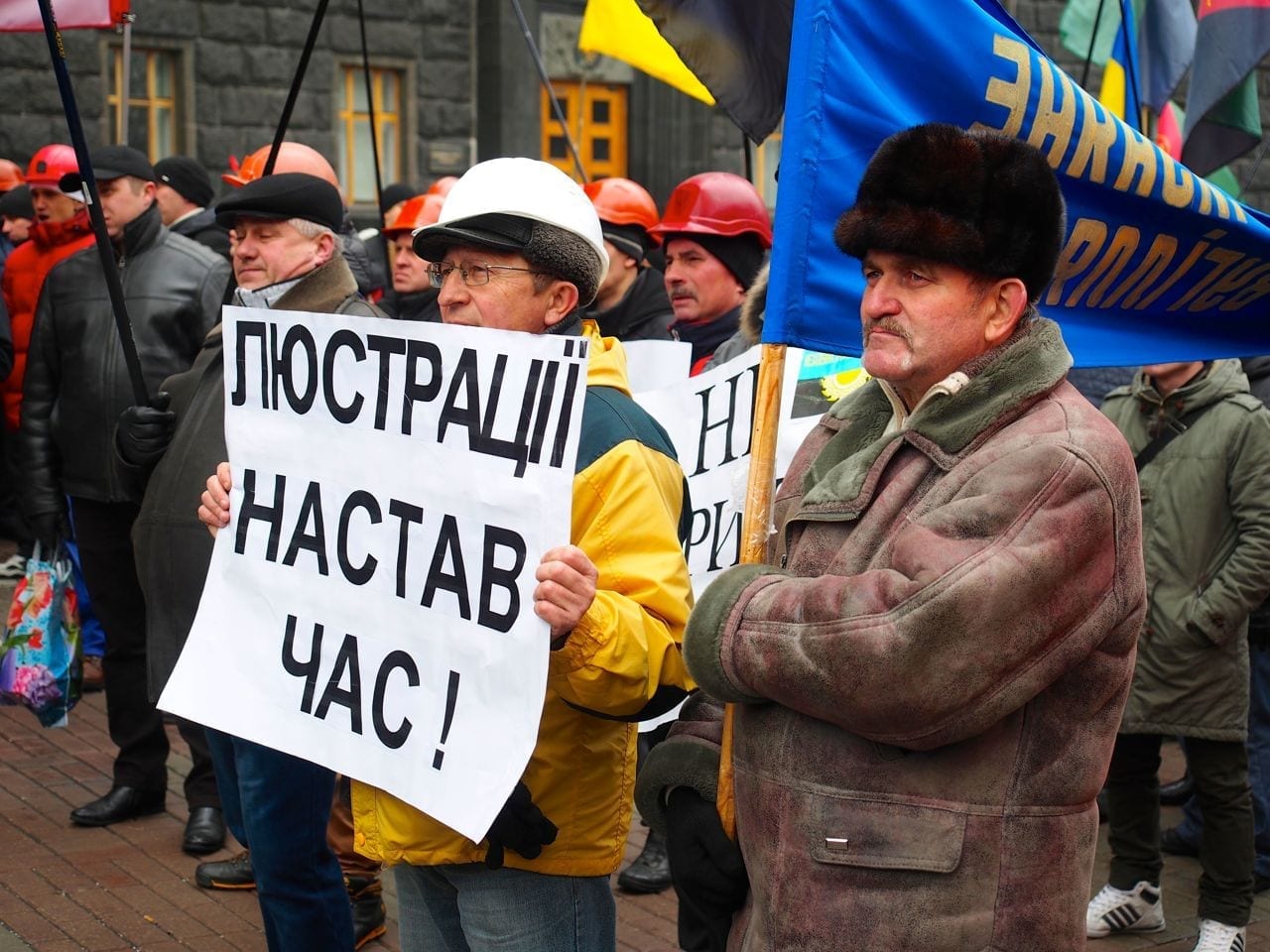
Mar 20, 2015
In Ukraine, a first-of-its-kind worker rights center is serving a broad spectrum of working people through labor and human rights education, cultural events and hands-on support in resolving day-to-day workplace issues.
Launched in late 2013, the Labor Initiative drew more than 3,000 people to some 200 educational and community events in its first year. A project of Ukrainian trade unions and the Solidarity Center, the Kiev-based Labor Initiative now averages between eight and nine legal consultations and referrals per day. Allies include local Ukrainian trade unions from health care, education, mine working, construction, the informal economy and other sectors.
“The center has been an important improvement for us, for our capacity to support workers,” says Veniamin Tymoshenko, union activist and vice president of a national aviation crew union. “We have been able to rely on legal support on several key cases that helped us mobilize workers, fight corruption and press for democratic reforms.”
Most recently, the center has been assisting mineworkers displaced by fighting in eastern Ukraine, along with ongoing legal support to active mineworkers.
In one recent case, the center helped an injured mineworker obtain proper disability classification, enabling him to receive ongoing compensation. Despite his worsening condition, the mineworker had not been certified to receive assistance. Trade union leaders say that disability claims in Ukraine often are not honored because medical officials may work closely with employers who offer them financial payments to deny worker disability claims.
Wage theft and illegal firings are the most frequent workplace issues. An ongoing case involves a worker at a large auto parts company who was hired by a subcontractor and realized she was not receiving her full wages because her pay was off the books—the “double envelope” system widespread in Ukraine. When the worker brought the issue to tax authorities, the tax office warned her it likely would not inspect the company and, if it did, she would be charged with tax avoidance and fined.
Both union and nonunion workers can receive legal consultations through the support of the center’s network of labor attorneys. In addition, the center and Solidarity Center staff provide policy and research assistance to Ukrainian unions. The Labor Initiative gets the word out about its services by distributing pamphlets to union offices and at union meetings across the country, and also advertises its legal aid services in high traffic areas, such as on public transportation.
The center has become a community and education hub, hosting events seven days a week, providing a space for union and community group meetings and a weekly labor and social justice film club.
Unions are at the center of reform efforts in the country, and the Labor Initiative offers a key space where workers not only can receive individual workplace assistance but also join to collectively champion democracy.
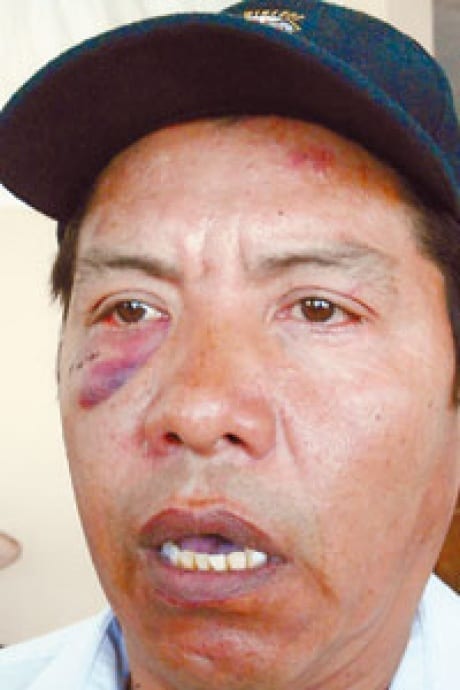
Mar 13, 2015
A union activist of the IndustriALL Mexican affiliate National Miners’ Union SNTMMSRM, also known as Los Mineros, has been severely beaten at the Gunderson railcar plant owned by the Greenbrier companies in Monclova, Coahuila state of Mexico. (Click here to sign a petition protesting the assault.)
On March 7, while he was distributing union leaflets, Jesus Antonio Campos Valle, leader of the SNTMMSRM organizing campaign at the Gunderson railcar plant was viciously attacked by several men, two of whom were identified as Hermilo Falcón López and “El Grande” Lumbreras Piña, members of the non-independent Confederation of Mexican Workers (CTM), which holds a protection contract at the company and prevents other unions from democratic representation of workers’ interests.
The SNTMMSRM denounced this attack as well as other acts of intimidation and harassment by the local leaders of the CTM, Jorge Carlos Mata and Mario Dante Galindo, directed at workers from Gunderson, Teksid and Pytco.
Workers at these three plants launched strikes in April 2014 to protest the lack of democratic representation by the CTM, a “protection union” that colludes with the employers and does not allow the workers to see their collective bargaining agreements. To resolve the strikes, the three companies agreed to recognize SNTMMSRM, but later backtracked and fired union leaders, including Campos.
Campos won a lawsuit ordering his reinstatement for unjust dismissal, but the company has appealed.
SNTMMSRM is now fighting a protracted legal battle against the companies and the CTM, who are supported by Alonso Ancira, the head of the AHMSA steel company, which is the largest employer in Monclova.
“They beat and kicked me in my face, head, chest, ribs and shoulders, all the time threatening me and saying they were from the CTM and they knew me and my family,” Campos stated. After receiving medical treatment, Campos filed a criminal complaint against the CTM leaders.
Jyrki Raina, IndustriALL general secretary addressed to the president of Mexico and denounced this violent act of aggression as “part of systematic attacks organized by the company in collusion with CTM intended to undermine workers’ right to elect democratically their own representative to collective bargaining. This is an inalienable right of workers envisaged in the ILO Convention 87”.
Send an online protest message to delivered to Enrique Peña Nieto, President of Mexico; Ruben Moreira, Governor of Coahuila; and William Furman, CEO of the Greenbrier Companies.

Sep 2, 2014
A panel of federal judges in Mexico dropped all criminal charges against Napoleón Gómez Urrutia, president and general secretary of the National Mine and Metal Workers Union (Los Mineros), freeing him to return to Mexico from Canada where he has lived in exile.
Gómez Urrutia, who was removed as president of the 250,000-member union by Mexican authorities and replaced with a company-backed rival, was repeatedly threatened and forced to leave Mexico in 2006. He also was charged with embezzling $55 million in union funds, an accusation struck down multiple times by the country’s courts. Following the August 28 decision, Gómez Urrutia said through Los Mineros that he plans to return to Mexico by the end of September.
Los Mineros said in a statement that “the next step will be to meet with the highest levels of government” so that Gómez Urrutia and Los Mineros can “contribute, in a framework of mutual respect, to the development of the industry and the defense of the rights of the workers and the well-being of their families.”
Days before he was removed as Los Mineros leader, an explosion at Grupo Mexico’s Pasta de Conchos mine trapped 65 mineworkers. Gómez Urrutia said the company and Mexican government only made minimal efforts to rescue the trapped men. The search for survivors was ended and the mine closed after five days, leaving the men entombed and their families waiting outside.
Prior to the explosion, Los Mineros had repeatedly cited dangerous working conditions and the smell of gas at Pasta de Conchos. After the company abandoned the men and sealed the mine, Gómez Urrutia publicly accused the mining company and the Ministry of Labor of “industrial homicide.” In response, the government filed criminal charges against Gómez Urrutia and other union leaders, froze the union’s bank accounts, assisted employers to set up company unions in Los Mineros-represented workplaces, declared the union’s strikes illegal and sent in troops to suppress them.
In 2011, Gómez Urrutia received the AFL-CIO George Meany-Lane Kirkland Human Rights Award, with AFL-CIO President Richard Trumka calling Gómez Urrutia a “truly courageous man who has shown us how difficult and how important it is to be an independent leader of a democratic union.” He also won the 2014 Arthur Svensson Prize granted to individuals or organizations working to promote trade union rights and/or strengthen trade union organizing around the world.
The AFL-CIO, the United Steelworkers and IndustriAll were among union organizations worldwide backing Gómez Urrutia and providing an international platform to champion his innocence.
Gómez Urrutia described the struggle by Mexico’s mineworkers for safety and health protections, decent wages and improved working conditions in his 2013 book, Collapse of Dignity, The Story of A Mining Tragedy and the Fight Against Greed and Corruption in Mexico. Collapse of Dignity details the February 2006 mine disaster and the subsequent attacks on him and Los Mineros. Most of the victims were temporary contractors with no training and insufficient oxygen supplies.
Feb 28, 2014
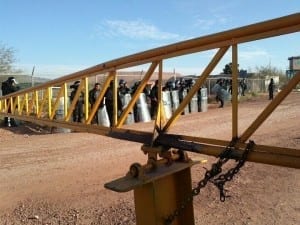
Miners at the El Coronel mine in Zacatecas, Mexico, voted to join the union Los Mineros. Photo: Julia Quiñonez
Mineworkers at the El Coronel gold mine in Zacatecas, Mexico, have voted to join the National Union of Mine, Metal, Steel and Similar Workers of the Mexican Republic, known as “Los Mineros” or SNTMMSSRM in Spanish, with 425 workers voting for the union to be its bargaining representative.
A team of international observers from non-governmental organizations and unions monitored the election and reported that the “voting on February 21 was conducted in a substantively fair and transparent manner, free of interference from the employer or government officials.”
Three unions were represented on the ballot, including Los Mineros. As it has done on previous occasions when there is concern of violence or vote-rigging, the Solidarity Center convened an international team of observers to ensure that the voting process was fair. The team served as a visible presence seeking to reduce the risk of any clashes, intimidation, or harassment and to detect any irregularities in the process that could have hindered the successful completion of a free election. Members of the independent observation team are all trained and experienced in international protocols for election observation, such as only interviewing workers after they have voted and not asking workers which union they voted for or other personal information.
The team included representatives of the Solidarity Center, United Steelworkers (USW), Border Committee of Women Workers (Comité Fronterizo de Obrer@s (CFO), the Project on Organizing, Development, Education and Research (PODER) and Project for Economic, Social and Cultural Rights (ProDESC).
More details about the campaign are available from the USW.






